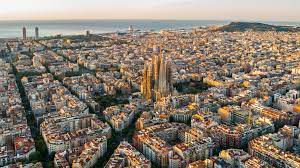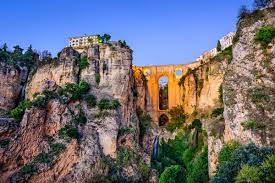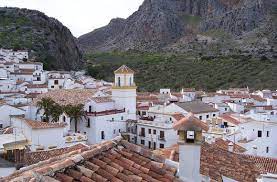By The Spanish Fly
Well, it took nearly 60 years but I made it in the end!
Obviously, when I was born in 1950 I didn’t yet know that Spain was to be my destiny; nor when I went to primary school and later to two different grammar schools, where only French, German and Latin were on offer. I did all three.

When I was 17, I didn’t know that Spain was to be my destiny either, as I was preparing to apply to study French and German at university. Then at my second interview for my first-choice uni they offered me the chance to start a new language ab initio, instead of either French or German, in exchange for a lower grade offer! The deal was done – I chose Spanish instead of French (don’t ask me why…) and the rest is history!
The early years
So as I fetch up on Las Ramblas in Barcelona at the ripe young age of 20 to start my year abroad, I am stunned by this exotic new world of seedy, noisy, but exciting Mediterranean life in the Catalan port city in 1970.
 After an exciting weekend in the Catalan capital (not that you would have known it was Catalan back then, since Franco was still very much alive and outlawing all public use of the local language), we set off – seven of us – in a hire car to drive across northern Spain to San Sebastián (Guipúzcoa) in the Basque Country, where we were due to spend three months studying at the university there.
After an exciting weekend in the Catalan capital (not that you would have known it was Catalan back then, since Franco was still very much alive and outlawing all public use of the local language), we set off – seven of us – in a hire car to drive across northern Spain to San Sebastián (Guipúzcoa) in the Basque Country, where we were due to spend three months studying at the university there.
We’d planned to do the journey by rail, but it was Easter and all the trains were fully booked. So, we hired a big car – a large SEAT. One snag – I was the only one of us with a driving licence!
One full day later – no motorways back then – and we arrived late at night in San Sebastián with nowhere to stay. However, Miss Pilling – we didn’t know her first name – who’d done Spanish A level at school and was better at Spanish than the rest of us, who were all beginners, soon sorted us out with a fonda in the Parte Vieja (Old Part).
Tired as we were we couldn’t resist going out for a drink. When we discovered that a glass of wine was only one peseta a glass (less than 1p), it became much more than one drink! We thought we were in heaven, and with delicious pintxos (tapas) at only five pesetas and Santana’s “Black Magic Woman” on the jukebox, the night was long.
So was the next day. I was very ill in the night (must have been the effort of the long drive… he says!) and the next morning my nausea mixed with the smell of fish and the sea air made for a hangover I have yet to repeat in the following 50 years!
But I was in Spain, and it was fantastic, if only because it was so different to anywhere else I’d ever been, which actually wasn’t anywhere much at that time.
After the hangover
The first night in San Sebastián had been an orgy of cheap wine, pintxos and Santana. This led to the worst hangover of my life.
 By the time I am fit to drink alcohol again two days later, the price of wine has doubled to two pesetas a glass! That’s one hundred per cent inflation! The locals are up in arms, but we don’t care, as it is still ridiculously cheap, less than 2d (<1p). By comparison a pint in the UK in 1970 was about two shillings (10p).
By the time I am fit to drink alcohol again two days later, the price of wine has doubled to two pesetas a glass! That’s one hundred per cent inflation! The locals are up in arms, but we don’t care, as it is still ridiculously cheap, less than 2d (<1p). By comparison a pint in the UK in 1970 was about two shillings (10p).
Once we are billeted with families, the only affordable option, we spend the next three months enjoying our new surroundings and new life. Typically, mornings are spent on the beautiful beach of Playa de la Concha, afternoons at lectures and evenings in the Old Part checking out the range of delicious pintxos and monitoring the price of the wine, before heading back to our digs for dinner prepared by our landlady Maria Nieves, Snow White as we call her!
The three months go quickly by, after which we are left to our own devices for three months. I’d got myself work in the office of a local tour operator, which eventually turns into a job as a guide collecting British and Irish pilgrims from Lourdes in France and showing them the high life of this most beautiful of the Basque cities.
After my six months’ sojourn in Spain, it’s off to Stuttgart, Germany, for a placement as a translator at Daimler-Benz, the car manufacturer. But Germany just isn’t the same and I miss the carefree, life-on-the-streets ambience of España.
The next several summers are spent repping back in Lourdes/San Seb, before the demands of a job in teaching and marriage make it too difficult to sustain.
Over the next several decades we (my wife and subsequently our two children) explore most parts of Spain through holidays and business trips. Although the country changes dramatically and quickly after the death of the dictator Franco in November 1975, it remains a great attraction for us all. Over the years our jobs take us to Madrid, Barcelona and Oviedo (Asturias) for short visits, which enables us to experience something other than the sand, sea and sun of the ever more ghastly development of the costas.
A New Life in Andalucía
After three decades of regular visits to Spain, it gets to the millennium and 25 years of married life.
 So, in summer 2000 my wife and I decide to celebrate our silver wedding anniversary by touring Andalucía, a region we don’t yet know. Flight to Málaga, two nights in spectacular Ronda, two in stunning Arcos de la Frontera, a sherry tour in tranquil Jerez de la Frontera, via beautiful Carmona to two more nights in gorgeous Córdoba, surely the best of the big three Andalucían cities (Sevilla, Granada and Córdoba), then via Roman Antequera back to bustling Málaga. We are both hooked on the region and decide to spend some of an upcoming windfall on a property in the Serranía de Ronda.
So, in summer 2000 my wife and I decide to celebrate our silver wedding anniversary by touring Andalucía, a region we don’t yet know. Flight to Málaga, two nights in spectacular Ronda, two in stunning Arcos de la Frontera, a sherry tour in tranquil Jerez de la Frontera, via beautiful Carmona to two more nights in gorgeous Córdoba, surely the best of the big three Andalucían cities (Sevilla, Granada and Córdoba), then via Roman Antequera back to bustling Málaga. We are both hooked on the region and decide to spend some of an upcoming windfall on a property in the Serranía de Ronda.
The following year, 2001, after several further visits to the area and lots of viewings, we buy a little apartment in the San Francisco barrio of Ronda, which we enjoy as a family for a number of years until life takes a sharp turn in a different direction.
After redundancy, early retirement and divorce in 2005 I am able to spend lengthy periods in Ronda, this beautiful cliff-top town. Over a couple of years, I do up two houses, one for me and one for my new girlfriend, Maude. I get to know lots of people, locals and immigrants alike. The social life is something I’d always craved, but never really had before, apart from when I was a student in San Sebastian, over three decades earlier.
Then finally in 2008, my somewhat chaotic life sorts itself out, everything comes together at the right time, I meet my little German Fräulein Rita and I am able to fulfil my dream of moving to Spain to live full-time.
So here I am, married again, to Rita, and living contentedly in her little old house in one of the white villages near Ronda, dabbling in a bit of writing and translating and feeling a lot younger than the 60 years old I become in 2010!
Epilogue: La carne de burro no es transparente
Life quickly settles down in Mo ntejaque, the beautiful village near Ronda where I am living with my German wife, Rita, who I sometimes refer to as the Meter Maid, for reasons which should be obvious to fans of The Beatles.
ntejaque, the beautiful village near Ronda where I am living with my German wife, Rita, who I sometimes refer to as the Meter Maid, for reasons which should be obvious to fans of The Beatles.
After a short spell at The Olive Press newspaper, during which time I also contribute articles to SUR in English, the Euro Weekly News and Olive Country Life magazine, the latter based in Alcalá La Real (Jaén), I become a blogger.
I get myself a website to promote my various activities, namely translating and interpreting, holiday rentals and house sales. The blog is a ruse to attract potential clients to my website.
 In the meantime, after three years we leave our little house in the village and move to the campo just outside Ronda. I get a garden, Rita gets a pool and we both get a house you can reach by car, which means no more schlepping shopping up the hill to the house in Montejaque.
In the meantime, after three years we leave our little house in the village and move to the campo just outside Ronda. I get a garden, Rita gets a pool and we both get a house you can reach by car, which means no more schlepping shopping up the hill to the house in Montejaque.
I am invited to write a blog for the online version of The Olive Press and for another local website, now defunct. As time goes on I grow disillusioned with translating. It’s boring being cooped up indoors with a laptop and a dictionary. And interpreting at the hospital, at the bank, at the lawyer’s becomes a nightmare in that many clients don’t really want an interpreter, they want someone to solve their medical, financial or legal problems. So, I give that all up. I continue to help out friends in exchange for a cup of coffee or a breakfast, but that’s a different kettle of fish. The house sales don’t really work too well either – too much competition. Around the same time I get writer’s block. So I stop blogging and my website lapses.
Over the last half a decade, I acquire some grandchildren of my own to add to the six on the German side of the family. All boys, born in 2016, 2019, 2020, and 2023 - two in Bow, East London, and two in Hastings, East Sussex.
The coronavirus pandemic then arrives and ruins all our plans: the Confirmation of a grandson in Germany; my 70th birthday celebration; an extended family knees-up in Germany; visits to the UK to see my children, grandchildren and brother; and our annual tide of visitors from Germany and the UK are all cancelled.
However, the COVID-19 lockdown, with its random fatalities, and the death in a plane crash of a family member in Australia, get me thinking about life and death – I am now 70 after all. It kick-starts me into action: gardening; carpentry; mending garden furniture; painting; pressure-washing terraces; and, after lockdown is eased, more socialising and eating out.
Rita and I tidy up our affairs and sort out new Wills. I buy new clothes and new furniture and we spend a tidy sum on sorting our water out and becoming a virtually chemical-free home. A descalzificador, a reverse osmosis unit, an ozone making machine, an industrial ozone vacuum cleaner and defumigator and an ozonised pool all mean no more limescale clogging up our pipes, boiler, radiators, taps, kettle and human digestive systems, no more bottled water and the contingent plastic waste, no more cleaning products and no more pool chemicals.
I decide I want to write again so approach Karl Smallman about contributing a blog to his Secret Serranía website. I also start contributing to www.eyeonspain.com.


Earlier this year, 2023, I decide to set up my own website, www.help-me-ronda.com, and to re-activate my house-selling activities via www.a1-inmobiliaria.net.
Editor: This is the first of the articles by The Spanish Fly. We hope you enjoy reading his somewhat random posts about travelling in Spain.
© The Spanish Fly
Tags:
Alcohol, Antequera, Arcos de la Frontera, Barcelona, blogger, Carmona, Cordoba, Coronavirus, Covid-19, Daimler-Benz, Devon, Euro Weekly News, Franco, French, German, Granada, Guipuzcoa, hangover, holiday rental, house sale, interpreting, Jerez de la Frontera, Karl Smallman, lockdown, Madrid, magazine, Montejaque, newspaper, North Devon, Olive Country Life, Oviedo, pandemic, Paul Whitelock, pintxo, peseta, Playa de la Concha, redundancy, retirement, Ronda, San Sebastian, Secret Serrania, Sevilla, Spain, Sur in English, The Olive Press, translating, wedding anniversary, wife, wine